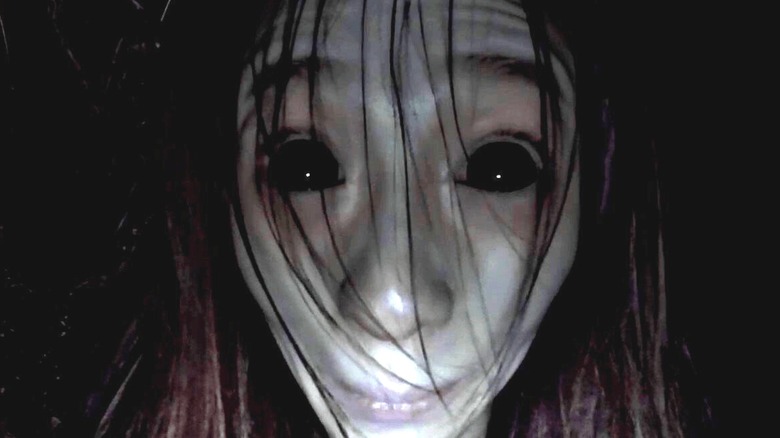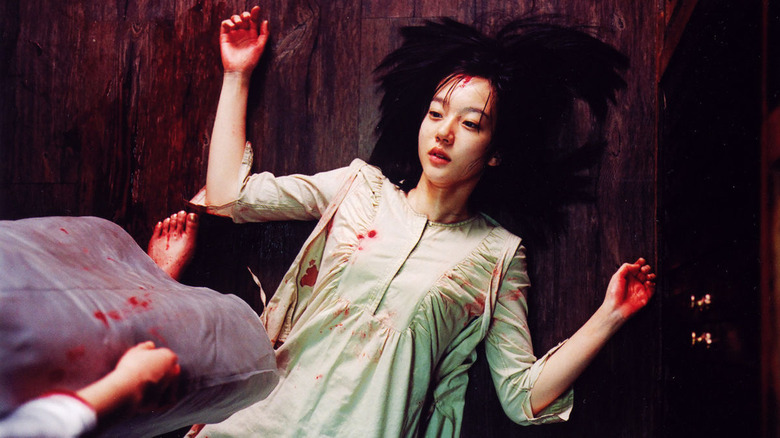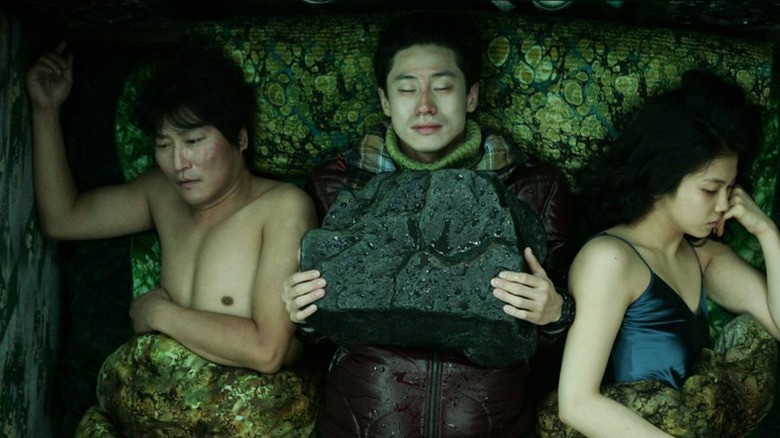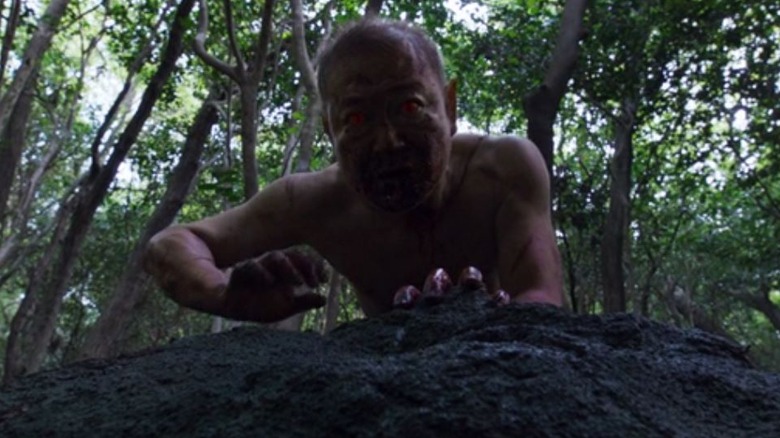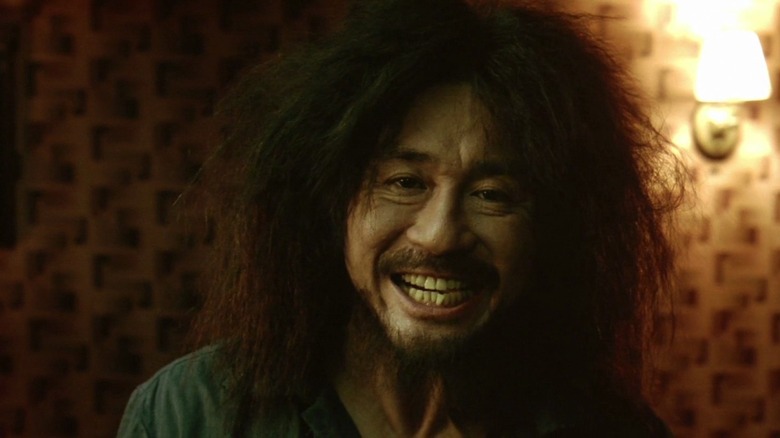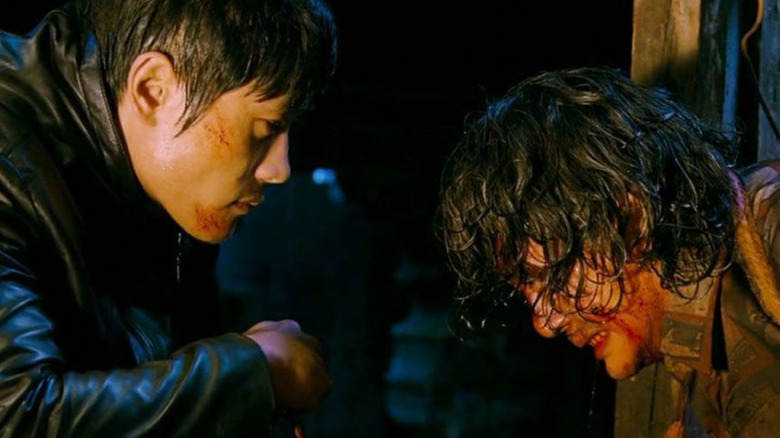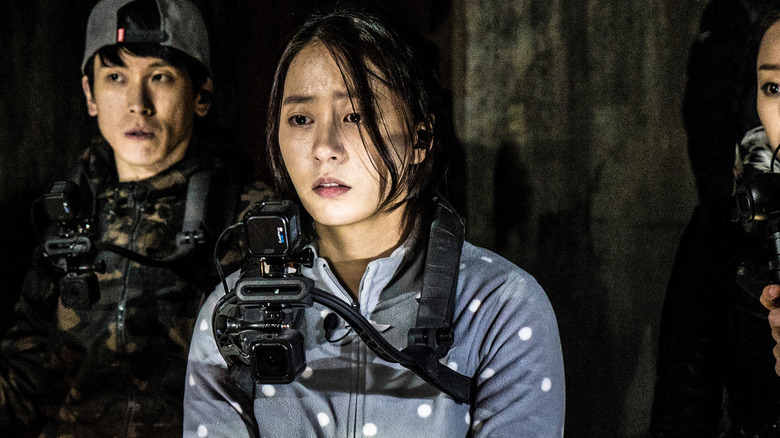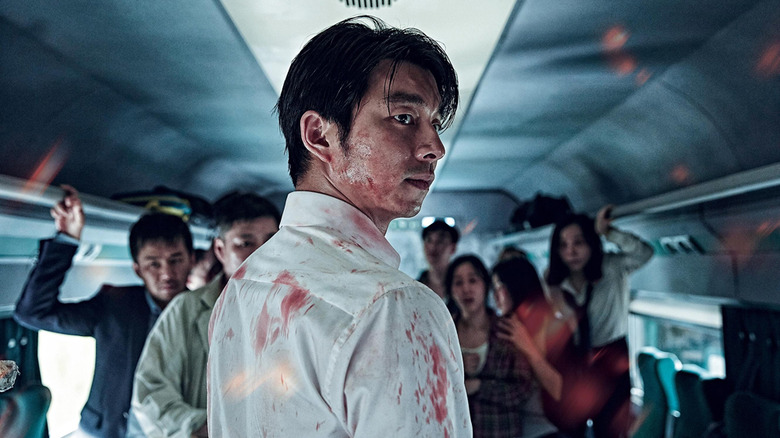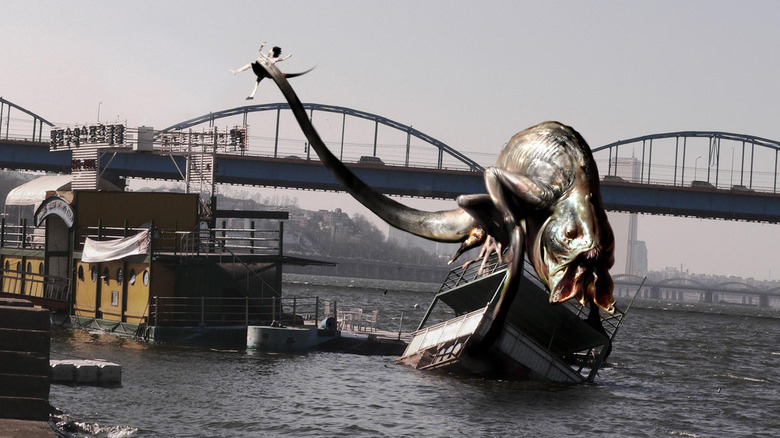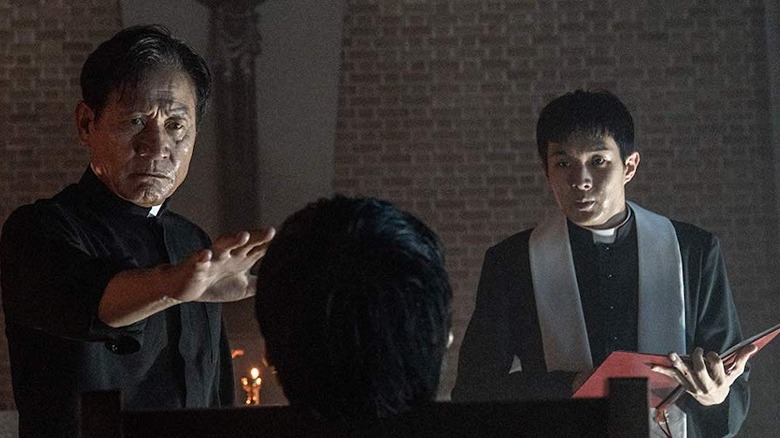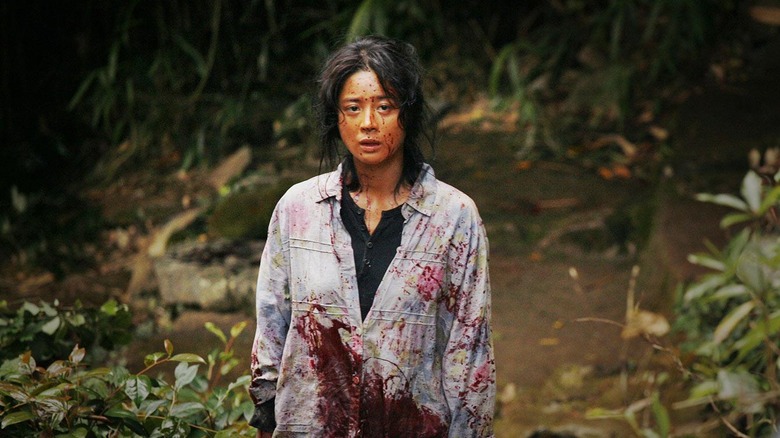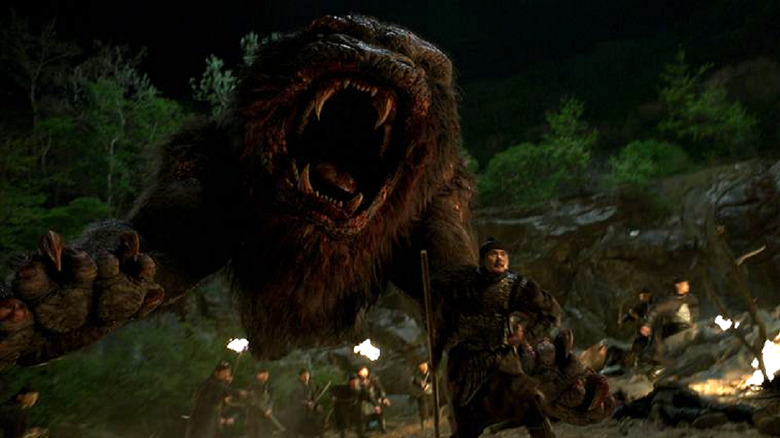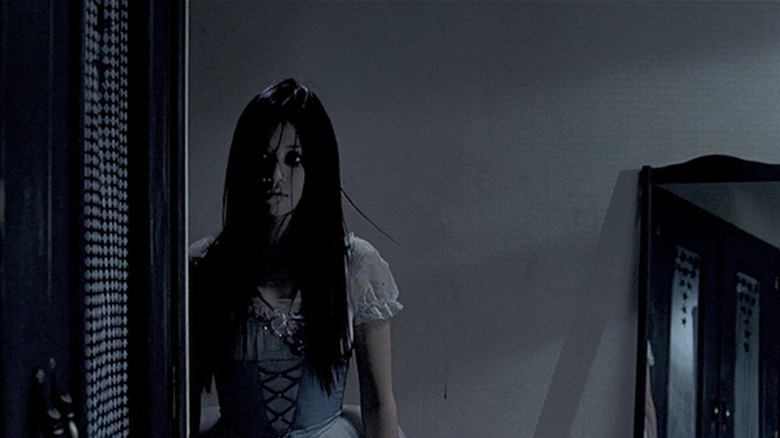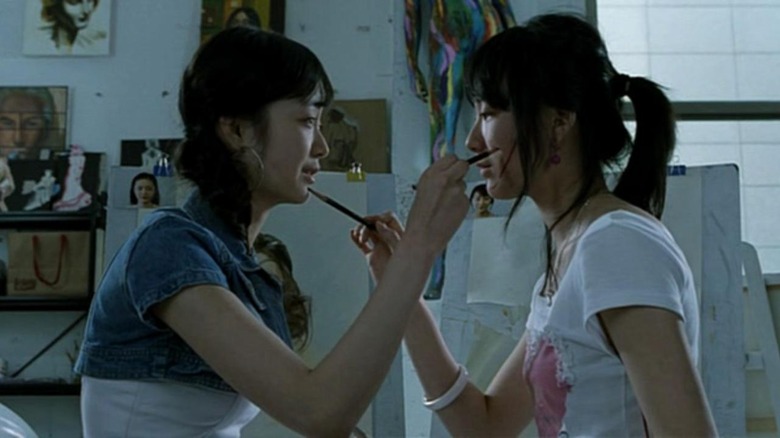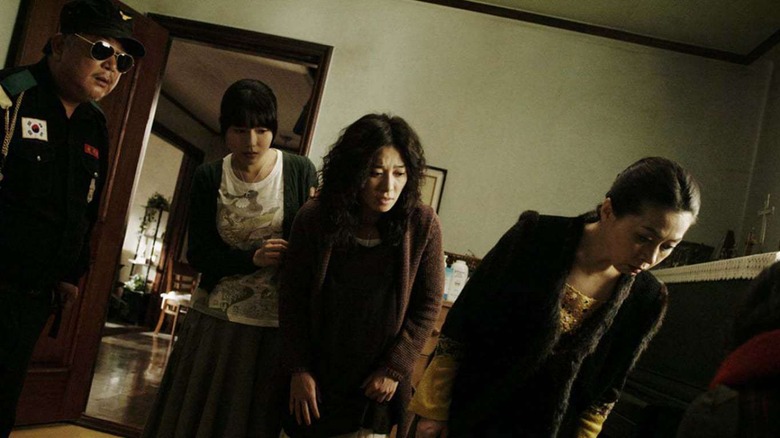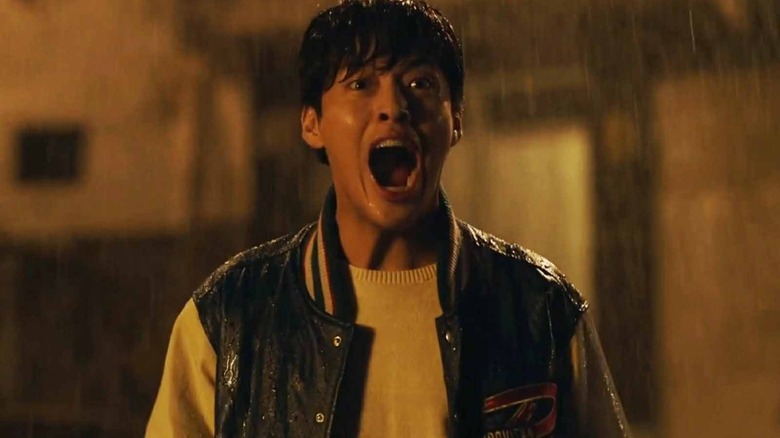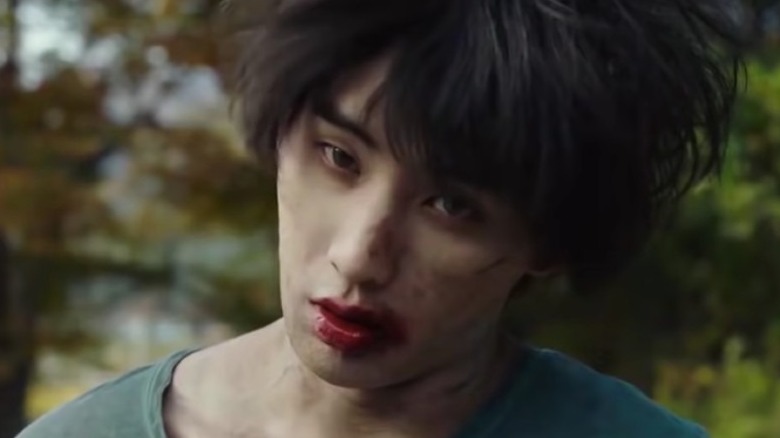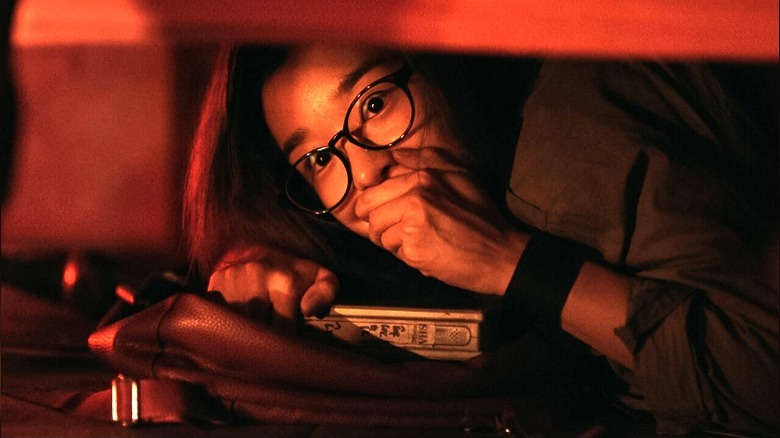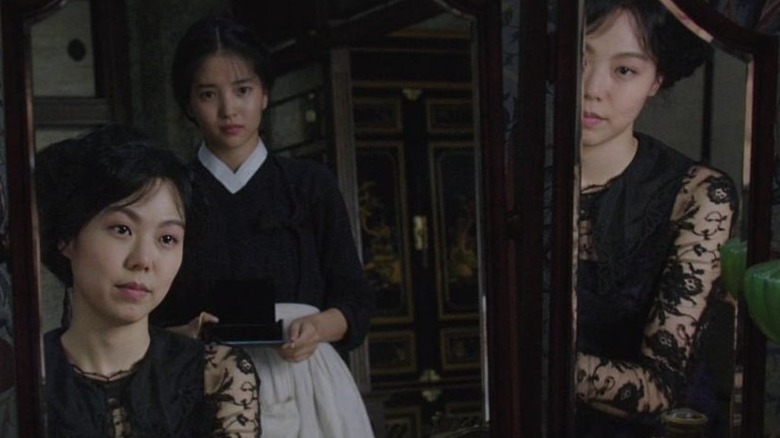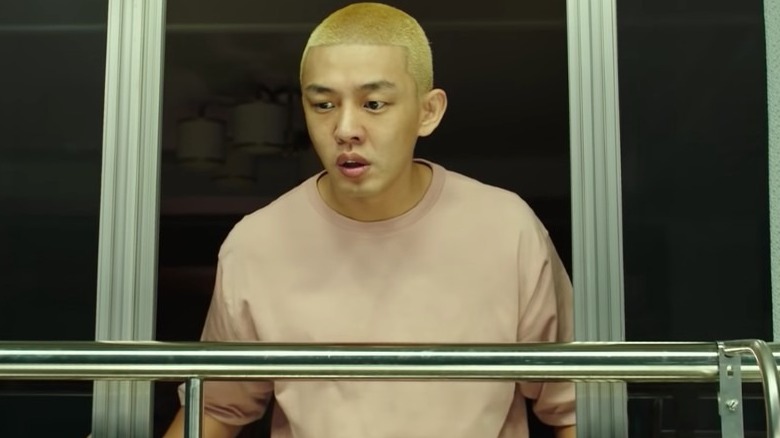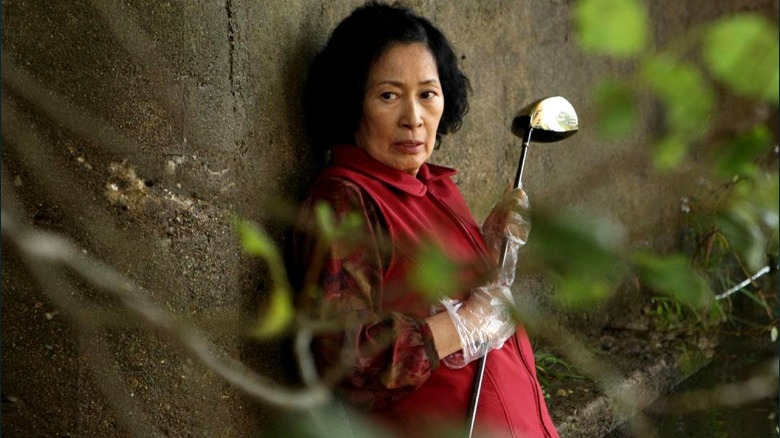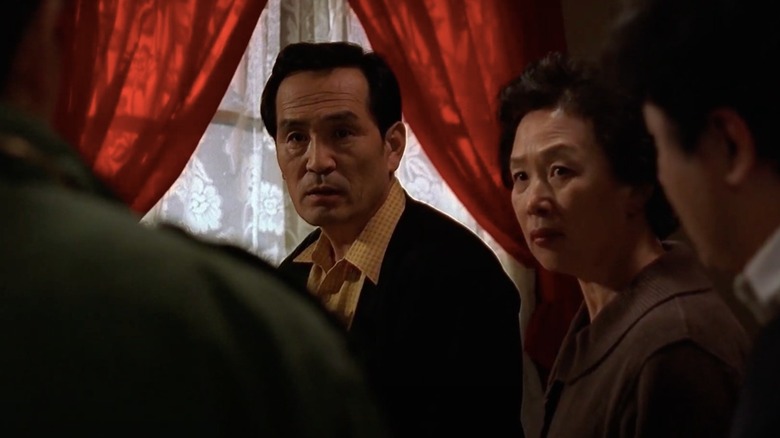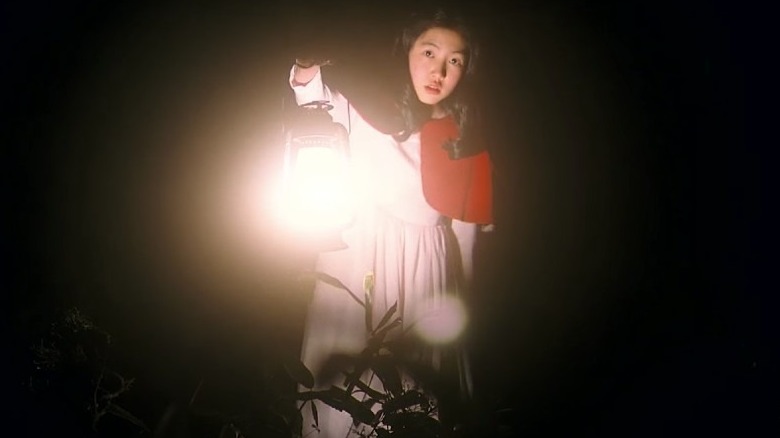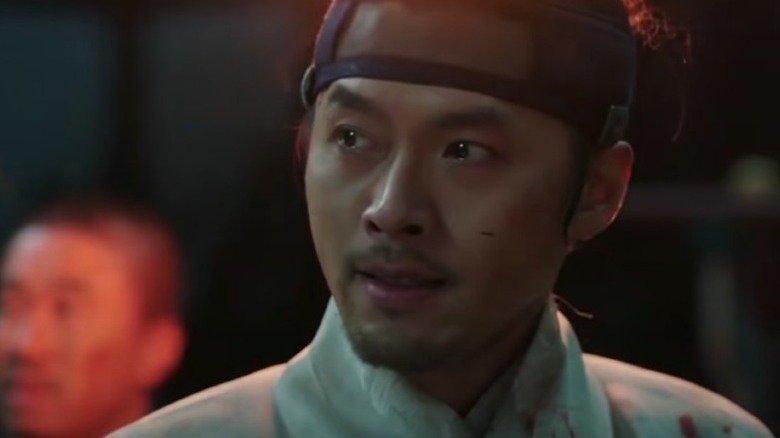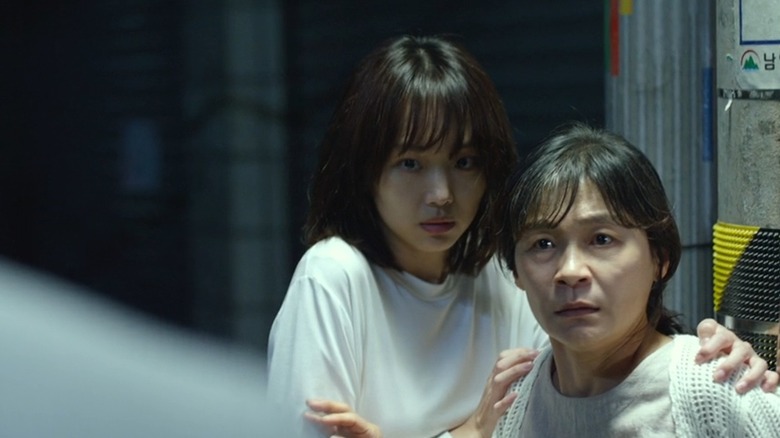24 Korean Horror Movies You Need To See
Korean horror movies are brutal, funny, and in a completely different league. The brand of horror found in Korean cinema contradicts much of what we expect from mainstream American movies. These films are not as concerned with quick cuts and jump scares, but rather digging into the deepest parts of the human subconscious, where dark thoughts grow like poisonous mushrooms. Violence is treated like an art form, beautifully choreographed in films like "Oldboy" and "I Saw The Devil" that illustrate the evil any person is capable of; in these movies, there isn't one explicit bad guy. Everyone can be the villain.
Directors like Bong Joon-ho and Park Chan-wook made names for themselves in the Korean horror scene, using the genre to create their own unique spins on well-worn tropes. Before "Parasite," Bong directed the environmental disaster film "The Host." Before "Stoker," Park made "Oldboy," as well as the rest of his Vengeance Trilogy. Korean horror films are masterclasses in building dread and tension, leading to deeply disturbing movies that offer twisted perspectives on the human condition. This list will highlight the best horror films that Korean filmmakers have to offer, which encompass everything from revenge thrillers to creature features to ghost stories.
A Tale of Two Sisters
Director Kim Jee-woo delivers a ghost story that's equal parts devastating and terrifying with his 2003 film "A Tale of Two Sisters." Su-mi (Im Soo-jung) is a teenage girl who was recently released from a mental institution and has returned home to the countryside with her father (Kim Kap-soo), younger sister Su-yeon (Moon Geun-young), and stepmother, Eun-joo (Yum Jung-ah). As she tries to settle in an uncomfortable routine with the cold Eun-joo, Su-mi starts to experience strange things happening around their home. A ghost girl appears under the sink, Su-mi is plagued with nightmares of her dead mother, and she suspects Eun-joo is abusing her younger sister.
Make no mistake: "A Tale of Two Sisters" is not your typical ghost story, and Kim has a twist or two up his sleeve. It is the quintessential Korean horror film, full of jump scares and tragedy at the same time. "A Tale of Two Sisters" doesn't just want to be scary. It wants to get into the viewer's heads and dig deep into their emotions. "A Tale of Two Sisters" is more than just a horror movie; it's a horror experience.
Thirst
This is the first mention of Park Chan-wook on this list, but it certainly won't be the last. Park's 2009 film "Thirst" is a touching, sexy, and gory vampire tale that provides a fresh perspective on the well-worn subgenre. Sang-hyun (Song Kang-ho) is a priest who is secretly in love with a married woman named Tae-ju (Ok-bin Kim) and is doubting his faith. In an attempt to prove his devotion to God, Sang-hyun volunteers to be a test subject for a vaccine against a deadly virus. But the experiment goes wrong and he turns into a vampire. Sang-hyun tries to avoid his newfound love for human blood, but ultimately cannot resist his hunger.
When Sang-hyun feeds, it's not just violent; it's really sexy. "Thirst" has perhaps the hottest sex scene I've ever seen in a horror movie. Song, who wowed the world with his performance as the poor patriarch in "Parasite," once again steals the show as a vampire full of ennui about his new state of being. While he mopes and ponders mortality, Sang-hyun is placed in direct contrast with the sexual and free Tae-ju, who wants to exercise power over those who doubt her. It's a domestic drama full of bloodthirsty creatures who are just trying to survive.
The Wailing
"The Wailing" is Korea's response to religious horror films focused on Christianity and the battle between God and the Devil. By contrast, Na Hong-jin's 2016 film is a religious epic about Korean mysticism and ritualistic practices that include an elaborate, yet futile, exorcism.
In the small rural town of Gokseong, a strange disease is infecting residents, making them go mad and commit violent crimes. The string of murders are linked to the arrival of a Japanese man (Jun Kunimura) who lives on the outskirts of town. As the body count rises and his daughter becomes infected, police officer Jong-goo (Kwak Do-won) begins digging into the truth behind the disease. He's desperate for a solution, and his family eventually turns to a shaman for some kind of answer.
But this situation is much more complicated, and an exorcism can't solve things. "The Wailing" is a story full of ghosts, zombies, and demons that, despite a 156-minute runtime, never gets boring. It's about religious fear, but also about the fear of the outsider. Korea was once under Japan's colonial power and experienced a series of atrocities at the hands of the Japanese. This, plus actions taken by Japan during World War II, bred animosity between the two countries, which is reflected in "The Wailing" through Kunimura's character; his invasion of a small Korean village comes with the historical weight of decades of anger.
Oldboy
If you're looking for some classic Korean brutality, look no further than Park Chan-wook's 2003 revenge thriller "Oldboy". Oh Dae-su (Choi Min-sik) has been imprisoned in the same room for 15 years. He has no idea who captured him or why. Then, one day, he is spontaneously released, which launches a search for those who ruined his life so that he can enact his revenge. Along the way, Dae-su falls in love with a young chef, which complicates his plan for vengeance.
"Oldboy" has it all: Choi eating a live octopus, the iconic hammer-in-a-hallway fight, shocking revelations, and a tragic ending that feels like a punch in the stomach. This is a film full of twists, turns, conspiracies, and lies; just when you think you know where the film is heading, Park subverts your expectations. "Oldboy" is not an easy watch, but if you can stomach it, it's worth it. Park is an incredibly talented filmmaker and captures the nuance and complexity of revenge, a theme he expands on in the rest of his Vengeance Trilogy, which also includes "Sympathy for Mr. Vengeance" and "Lady Vengeance."
Importantly, do not watch Spike Lee's remake with Josh Brolin. It waters down what makes "Oldboy" such a visceral experience and misses Park's core message about the destructive power of revenge.
I Saw the Devil
Kim Jee-woon's 2011 serial killer film "I Saw The Devil" is a heart-wrenching piece of brutality that depicts the futility of revenge. Jang Kyung-chul (Choi Min-sik) is a serial killer who preys on helpless young women. His latest victim is the pregnant Jang Joo-yun (Oh San-ha), who he rapes and slaughters with a homemade guillotine before scattering her body parts in streams. When her ear is discovered, Joo-yun's fiancé Kim Soo-hyun (Lee Byung-hun), an agent for the National Intelligence Service, vows to get revenge against the monster that killed her.
But this isn't a movie about his search for Kyung-chul. This is a movie about how Soo-hyun tortures Kyung-chul, refusing to grant him a quick and easy death. It's an agonizing game of cat-and-mouse in which no one is the winner and everyone is sad. And yet, it's worth your time. There's something special about a Korean horror film that makes you feel so upset, and yet still grateful that you put yourself through it.
Gonjiam: Haunted Asylum
"Gonjiam: Haunted Asylum" is easily one of the best and scariest found footage films to be released in the last 10 years. It follows the creators of a paranormal YouTube channel who have announced that they and a group of six random people are venturing into the abandoned Gonjiam Asylum to try and capture a ghost on camera. They want to reach one million viewers on their livestream, and they'll do anything to get it.
What makes "Gonjiam" so effective is how it subverts the audience's expectations. Yes, as a found footage movie, it's mostly shot from a first-person point of view, but the camera is not in the hands of only one person. Instead, by giving each character a camera, director Bum-shik Jung is able to focus on creating more horrific set pieces, including a close-up shot that will make you jump out of your skin (you'll know it when you see it).
"Gonjiam" effectively mixes sound design, found footage tropes, and real urban legends to create a film that is truly scary. If you aren't convinced about the effectiveness of found footage as a way to tell horror stories, "Gonjiam: Haunted Asylum" may just be the film to change your mind.
Train to Busan
Zombies had their heyday in the early 2010s, but eventually over-saturated the world of horror to the point where they became more laughable than scary. But Yeon Sang-ho's 2016 film "Train To Busan" gave zombies the kick they needed and made the monsters scary again.
Seok-woo Seo (Gong Yoo) is a workaholic who, despite his best efforts, has a strained relationship with his young daughter. In an attempt to fix things, he takes her on a trip to Busan. But this standard ride quickly turns deadly as an infected person stumbles on board and begins spreading the zombie virus throughout the train. Passengers are turned at an alarming rate, and survivors try to block off cars to protect themselves. But with such limited space, survival becomes increasingly more difficult as they approach Busan.
The claustrophobia of the train cars make "Train to Busan" unique. These characters aren't wandering a sprawling city ravaged by the undead. Instead, "Train to Busan" is a much more focused film that takes the terror of a pandemic and focuses it in one place.
The Host
Bong Joon-ho's environmental creature feature "The Host" does what Bong does best: fuse great horror with an emotional core and a larger social message. An American scientist orders the dumping of formaldehyde into the Han River in Korea, damaging the local ecosystem. Fish are dying and the frogs that populate the river are starting to look a little strange.
One day, a mutant amphibious creature emerges from the river and wreaks havoc on the riverfront. Among those affected is local merchant and lowlife Park Gang-du (Song Kang-ho) who runs a snack stand with his daughter Hyun-seo (Go Ah-sung) and father Hee-bong (Byun Hee-bong). They're separated during the chaos, and Hyun-seo becomes trapped in the sewers with the monster. Gang-du, Hee-bong, and Gang-du's siblings (Bae Doona and Park Hae-il) band together, despite their dysfunctional family dynamic, to save the youngest member from a terrible fate.
Bong based "The Host" on an actual chemical spill from 2000, when an American mortician did actually dispose of formaldehyde by dumping it down the drain. This event not only destroyed the Han River, but also encouraged anti-American sentiment in the country, as the Americans made it seem like they didn't care about their host country; they just saw it as a dumping ground.
The Divine Fury
"The Divine Fury" has everything: martial arts, the battle between good and evil, MMA fights, demons, and exorcisms. Yong-hu (Seo-joon Park) is a martial artist who, after losing his father as a child, abandoned his faith. And like any good religious horror movie, that faith is pulled back into question as he has an experience with the supernatural. In this case, Yong-hu develops stigmata and seeks answers from priest and exorcist Father Ahn (Ahn Sung-ki).
The affliction gives Yong-hu powers that help him destroy demons that possess human hosts. As they fight side-by-side, developing a tentative father-son relationship, Yong-hu and Ahn discover a deeper conspiracy after a club owner quite literally makes a deal with the Devil. Between the fights in the ring and the violent exorcisms, "The Divine Fury" is a flashy, well-choreographed film that takes the religious horror film to another action-packed level.
Bedevilled
Get ready for another brutal revenge thriller — but this time, it's about a woman who finally snaps.
"Bedevilled," Jang Cheol-soo's 2010 directorial debut, Bok-nam (Seo Young-hee) is a repressed housewife who lives on an isolated island with her abusive husband, controlling neighbors, and young daughter. She is told that it's her duty to obey her husband, and any abuse that she experiences is all her fault. Then, when an old friend (Hwan Geum-hee) comes to visit, Bok-nam sees an opportunity to escape with her daughter to Seoul.
But her plan doesn't work out, and Bok-nam finally loses it. Armed with a sickle, she goes on a rampage against those who hurt her. Both Bok-nam's revenge and the sexual, physical, and emotional abuse she experiences on a daily basis are incredibly brutal to watch. Still, this is a cunning inversion of the divisive rape-revenge subgenre, one that wants you to really get into Bok-nam's head to better understand her violent motives, that won a number of awards on the festival circuit.
Monstrum
Huh Jong-ho's "Monstrum" is a perfect fusion of creature feature and period piece, a combo that's pretty difficult to find. The film takes place in 1527 during the rule of King Jungjong (Park Hee-soon). A plague has ravaged the country, and there are rumors of a man-eating monster who's stalking the mountains, picking people off one by one. The king tasks general Yun Kyum (Kim Myung-min) to discover the truth and catch whoever is responsible for these crimes.
What follows is a bloodbath. The monster, based on the haetae, a creature with a lion's head, a single horn, and scales, is absolutely massive. Director Heo Jong-ho claims that "Monstrum" is based on a true story, which is technically correct: During the Joseon dynasty, there was a rumor about something that was eating people not long after a deadly plague swept across Korea. While it was never confirmed to be an actual beast, Heo brings the "what ifs" to life.
Wishing Stairs
Yun Jae-yeon, the only female director on this list, directed the 2003 ghost story "Wishing Stairs," which takes place in an all-girls art school. It's the third film in the "Whispering Corridors” franchise, but has no connection to the previous two movies.
In "Wishing Stairs," there's a rumor that, if you walk about a specific flight of stairs and discover the 29th stair, you can make a wish and a fox spirit will grant it. This comes in handy when a bitter rivalry flares up between friends Yun Jin-sung (Song Ji-hyo) and Kim So-hee (Park Han-byul) as they compete for a spot in a prestigious ballet academy. Jing-sung tries the stair trick and discovers that it's true, so of course she wishes for admission to the ballet school. However, as often is the case with wishes, nothing is what it seems — Jing-sung quickly regrets her actions. This isn't just a story about an urban legend, but a story about jealousy, rivalry, and the lengths we'll go to come out on top.
Cinderella
The 2006 horror film "Cinderella" comments on the booming plastic surgery industry in Korea with a tale about a plastic surgeon who has sinister intentions. Hyeon-su is the daughter of Yoon-hee, a successful plastic surgeon who has worked on plenty of Hyeon-su's friends. To Hyeon-su, her mother is perfect in every way — they seem to have a perfect relationship. But then, Hyeon-su' friends begin committing suicide by slicing upon their faces and mumbling, "I'll make you pretty." As she connects the dots, Hyeon-su realizes that her mom may not be what she seems.
The story spirals into bizarre yet intriguing territory that contains both supernatural pottery and masks. In Korea, teenage girls get plastic surgery at a young age, obsessed with being "beautiful" as defined by unrealistic beauty standards. Director Bong Man-dae uses "Cinderella" to shine a light on the countrywide struggles Korean teenagers face, and the pressure they feel to conform to a particular way of looking and being.
Possessed
In "Possessed," Hee-jin (Nam Sang-mi) returns home after her younger sister So-jin (Shim Eun-kyung) goes missing. Waiting for her is her overly religious mother (Kim Bo-yeon), who refuses to involve the authorities in the search for So-jinn. But then, a neighbor commits suicide, which reveals that more than one neighbor believed that So-jinn was actually possessed.
While Hee-jin experiences increasingly bizarre and terrifying dreams, police officer Tae-hwan (Ryoo Seung-ryong) becomes drawn deeper and deeper into a truly unique and horrifying case. This is another film that, like "The Wailing," addresses shamanism in modern Korea and how it contrasts with more contemporary Catholic beliefs. "Possessed" is heavy with tension, and makes the viewer question their own beliefs about what is actually unfolding on screen. This isn't a film that wants to provide easy answers, but instead wants to tangle the viewer in its web until the very end.
Forgotten
Writer-director Jang Hang-jun's 2017 feature "Forgotten" is a difficult film to discuss without venturing into spoiler territory. The set-up goes like this: Jin-seok (Kang Ha-neul) and his family move into a new house, and Jin-seok gets the uncomfortable feeling that he's been there before. Within a few days, weird noises start coming from a forbidden room, and it seems like you're about to experience a haunted house story. But then Jin-seok's brother Yoo-seok (Kim Mu-yeol) is kidnapped. He returns 19 days later, but is no longer the same. His limp is gone, and his behavior is slightly off.
Jin-seok suspects that someone — or something — has taken over his brother's body, but he can't prove it. So, he starts stalking his brother whenever he leaves in the middle of the night, desperate to find answers. What he uncovers is far more diabolical than he could have predicted.
"Forgotten" plays on genre tropes to misdirect the audience into believing, just like Jin-seok, that what's happening is real. Is it all a figment of our collective imaginations? Or are we being fooled by the director? You'll have to watch "Forgotten" to find out.
The Odd Family: Zombie on Sale
Director Lee Min-jae's feature film debut is an impressive one. 2019's "The Odd Family: Zombie on Sale" (co-written with Jung Seo-in) has a comedic tone similar to the one in Shin'ichirō Ueda's "One Cut of the Dead," but the film approaches the genre through a very different lens. When a pharmaceutical company tests out a new diabetes medication, they unwittingly create a zombie virus that is not your typical run-of-the-mill apocalypse starter.
More than anything, family patriarch Man-duk (Park In-Hwan) wants to pull his family out of the lower-middle class, but a spiraling economy keeps him scrounging for scraps. His wife, Nam-joo (Ji-won Uhm), is a stern figure, constantly nagging him about finances, with his two sons, Joon-gul (Jung Jae-young) and Min-gul (Kim Nam-gil), and daugther Hye-gul (Lee Soo-kyung) rounding out his eccentric, possibly psychopathic, clan.
A homeless man in a bathroom gets bitten and turns into a full-fledged zombie, yet when Man-duk gets a chunk of flesh torn from his body, he experiences something wildly different. He's not turning into a flesh-eater, but a younger version of himself. This sparks a new entrepreneurial idea: convince people to pay to be bitten. "Zombie on Sale" pulses with a tremendous amount of heart while following an unlikely love story between Hye-gul and the zombie. It's fresh, wild, and an utter delight.
Warning: Do Not Play
In writer-director Kim Jin-won's 2019 film "Warning: Do Not Play," an urban legend circulates about a movie filmed by a ghost. At the same time, Park Mi-jung (Seo Yea-ji) is an up-and-coming filmmaker struggling to find inspiration for her next project. She hears from a good friend that mayhem erupted at the movie's premiere, leading to countless deaths, including one by heart attack. Problem solved, right?
But, as Park searches for answers, everyone she comes across warns her about the dangers of probing any further. And yet, Park posts an anonymous message online, asking anyone with information about the movie or where it was filmed to reach out to her. The film's director, Jae-Hyun (Jin Sun-kyu), responds, but his disheveled appearance and strange behavior only make her more curious.
Incorporating found footage elements, "Warning: Do Not Play" is made of pure nightmare fuel, especially as the aspiring filmmaker learns the meaning of the phrase "curiosity killed the cat." All along the way, Jin-won plays with your expectations; you may not be expecting it, but what you'll receive here is a totally surprising and enthralling ghost story.
The Handmaiden
Park Chan-wook is one of the great visionaries of our time. He speaks a particular poetic language in much of his work, and through a screwy, erotic psychology, manages to delve into layers of the human existence that transcends the medium itself. Park's 2016 film, "The Handmaiden," is a rich tapestry of greed, lust, and betrayal that unfolds in three parts, featuring gorgeous cinematography from director of photography Chung-hoon Chung.
When a handmaiden named Sook-hee (Kim Tae-ri) arrives at the lavish estate of Lady Hideko (Kim Min-hee) at the behest of her co-conspirator Count Fujiwara (Ha Jung-woo), she's in ensnared in a dark, seductive web. Here, things are never quite as they seem. For one, Sook-hee and Fujiwara are plotting to steal Hideko's family fortune. For another, as Sook-hee gains Hideko's confidence, an unexpected romance blossoms with a feverish, sweaty intensity. But that's just the beginning. The complexity of the story and everyone's involvement grows more tangled with each chapter, and Park's ability to keep you hooked for 144 minutes is impressive. Trust me, not a single minute is wasted.
Alive
Zombie movies are a dime a dozen these days, making it hard to imagine what else there is to say in the genre. So, yes, I was surprised by writer-director Cho Il-hyung's 2020 film "Alone," based on a short story by Matt Naylor. While fully embracing the zombie apocalypse and its wacky rules, Il-hyung sends the viewer on a heart-pounding roller coaster ride that packs an emotional thematic punch (just be aware that it should come with a trigger warning; the film contains a very graphic depiction of attempted suicide by hanging).
The film opens on the central character, Joon-woo (Yoo Ah-in), your typical tech-obsessed Gen Z-er. We see him gaming with his friends, various gadgets flickering around him, when the outbreak hits. Over the coming days, the technology slowly fizzles out, and his connections to the outside world prove to be nonexistent. Eventually, Joon-woo befriends a young girl named Kim Yoo-bin (Park Shin-hye), who lives across the street in another building. Together, they must learn to trust one another and survive.
In its small-scale approach and focus on basic survival, "Alive" is unlike other zombie movies. This isn't a film with global stakes. The plot largely focuses on a single city block in a bigger metropolis. Still, the fear of death hangs thick on the camera lens; "Alive" is the kind of heartfelt, provocative narrative that sticks with you for weeks.
Mother
In Bong Joon-ho's 2009 film "Mother," a young man named Yoon Do-joon (Won Bin) is accused of murder in a very small town in South Korea. Do-joon has a learning disability, which makes him an easy scapegoat for the police, who consider it an open-shut case. However, Do-joon's mother (Kim Hye-ja) doesn't believe the allegations and goes on a vigilante mission to prove his innocence. She'll do almost anything to uncover the truth, but the trail leads her down a dark rabbit hole she may soon regret following.
"Mother," which Bong co-wrote with Park Eun-kyo, is a simple revenge tale, one entrenched in loyalty to family, forgiveness, and morality. At one point, a newly-hired lawyer suggests sending Do-joon to a mental hospital for four years in lieu of a 15-year prison sentence. The offer is tempting, but his mother vehemently declines the idea and digs deeper into her quest for truth. And when the dead girl's phone proves to be a vital piece in the puzzle, Do-joon's mother learns that everyone in her world has secrets, and that she may have one of her own to add to the ever-growing pile.
The Quiet Family
The 2019 Oscar-winning film "Parasite" feels directly inspired by Kim Jee-woon's tar-black 1989 horror-comedy "The Quiet Family." In terms of humor and visual style, both films could very well exist in the same spiritual universe, as they each deal with familial dysfunction and a desperation to climb out of the lower class.
In Kim's film, an extended family moves from the bustling city to a lodge nestled against a mountainous ridge. The father, Kang Dae-goo (Park In-hwan), and mother, Jeong Soon-rye (Na Moon-hee), hope to transform the isolated home into a hotspot for hikers heading into the surrounding mountains. Their very first guest checks into room 203 and requests some beer; his lifeless body is discovered the next morning. The hiker's suicide seems to spark some sort of ancient curse, leading to countless deaths in and around the property. Disheveled and confused, Dae-goo and Soon-rye bury the bodies out in the backyard.
"The Quiet Family" switches between sardonic humor and an earnest examination of the weight of death and the afterlife. You never know what lengths some people will go to for fortune and fame, even if doing so makes them awful people. The film's madcap tone makes for a delightful watch.
Hansel and Gretel
Director Yim Pil-sung upends every expectation when it comes to the classic Brothers Grimm fairytale. In fact, the children play a very different role in this take on the story. Released in 2007, "Hansel and Gretel" explores ideas around humanity's inherent kindness, torture and trauma, and the preservation of childhood innocence.
A working salesman, Eun-soo (Chun Jung-myung), is traveling along Highway 69 when he crashes his car and is knocked unconscious. When he awakes, he finds himself inside an enchanted forest. As he makes his way through the overgrown brush, he soon meets a young girl named Young-hee (Shim Eun-kyung), who's dressed up like Red Riding Hood. She leads Eun-soo through the woods to an idyllic two-story home, where he meets her parents, her older brother, Man-bok (Eun Won-jae), and his younger sister, Jung-soon (Jin Ji-hee). Everything appears to be normal enough until the parents flee in the middle of the night, leaving only a note that urges Eun-soo to stay and care for the children.
Of course, there's (always) more going on than first meets the eye. When Eun-soo tries to leave, he is forced back to the home after wandering aimlessly in circles. The children grow increasingly fond of him and plead for him to stay. But something (or someone) lurks in the attic. Before long, Eun-soo uncovers the truth, and must make a surprising choice. "Hansel & Gretel" brims with twists and turns, as knotty and coarse as the woods in which Eun-soo is trapped.
Rampant
"Rampant" is a perfect example of how, sometimes, critics get things wrong. Director Kim Sung-hoon stages a war between exiled Prince Lee Chung (Hyun Bin) and the Joseon minister of war, Kim Ja-joon (Jang Dong-gun), amidst an apocalyptic zombie outbreak. Written by Hwang Jo-yoon, the period-set action-horror epic is cinematic in every possible way. The combat sequences are nail-biting and thrilling, as well as appropriately gruesome.
Once Lee Chung and his goofy bodyguard, Hak-Su (Jeong Man-sik), return to Jemulpo, they discover that the village has been ravaged and destroyed. Lee Chugn's first assumption is that an uprising occurred, but then he's confronted by armed soldiers who attempt to kill and bury him. During their skirmish, a horde of zombies (or "demons," as they're called in this universe) climb out of the rubble and attack. Lee Chung continues to make his way to the king's court, and shares the news of the outbreak.
At first, the king commissions an army to eradicate the swarm, but then revokes the order. Instead, an upcoming banquet in honor of a nearby Qing dynasty goes on as planned — and it's total pandemonium. "Rampant" may have been raked over the coals upon release, but it's an action-packed adventure that's worth seeing for the kills alone.
Midnight
Kwon Oh-seung's debut feature, "Midnight," is one of 2022's most surprising releases. It's a nail-biter that'll leave you tense and breathless, unable to pick your jaw off the floor. The film stars Wi Ha-Jun, known for his work in "Squid Game" and the found footage classic "Gonjiam: Haunted Asylum," as deranged serial killer Do-sik. He's been stalking the neighborhood, leaving a trail of bodies behind him. While he's in the middle of killing a young woman, Do-sik spots a deaf woman named Kyung-mi (played by Jin Ki-joo) and her mother (Hae-yeon Kil). Believing them to be easy targets, he hunts them through the streets of South Korea. However, Kyung-mi proves to be far from easy to kill.
Kyung-mi may be deaf, but that doesn't make her weak. Far from it. She has a fierce spirit, and she's incredibly resilient. She's also perceptive, able to rely on her instincts to guide her through the city. On the other hand, Do-sik is not only out for blood; he also promises to psychologically scar his victims. When Do-sik sets his sights on you, he plays a cat-and-mouse game designed to break you down before he pounces, ripping out your insides. While "Midnight" may not be as viciously relentless as, for example, the Taiwanese film "The Sadness," it still delivers plenty of tension and violence to keep you entranced.
